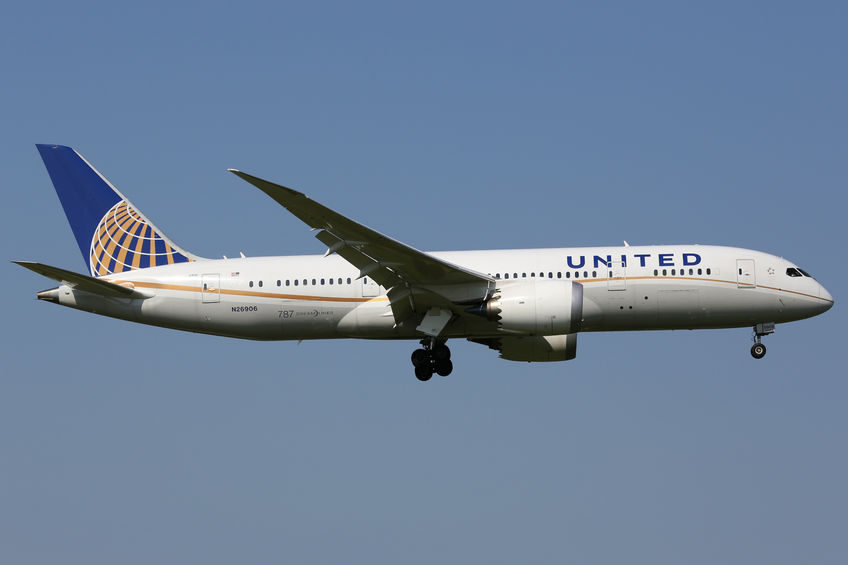United’s only flight to the continent of Africa is its Houston – Lagos, Nigeria Boeing 787 service. That route will be terminated June 30, with the aircraft supporting United’s increase in San Francisco – Tel Aviv frequencies to daily this fall.
Rumors that United simply got taken in by a 419 scam are, apparently, unfounded.

United Airlines Boeing 787
Instead there are two really interesting things that we learn about this flight.
- United says they’ve been losing money on it for years, but kept it because it was important to business customers in Houston.
- It’s being terminated now due to currency controls imposed by Nigeria.
Former Spirit Airlines CEO Ben Baldanza used to describe the difference between scheduling at the ultra low cost carrier and scheduling at his former employer United Airlines (née Continental) as being that the Houston-based airline had to schedule flights that were on their own unprofitable because running a business traveler-focused hub it was crucial to take business travelers where they wanted to go, when they wanted to go. So an early Monday morning bank of flights might depart half empty, several losing money in isolation, but those losses were necessary to earn profits on other flights.
The oil industry is suffering low fuel prices, and Houston is a key energy market. It’s why Emirates downsized their Houston – Dubai flight from an A380 to a Boeing 777. It’s why SAS eliminated their all business class Houston – Stavenger, Norway flight. United has had to make adjustments in Houston as well.
Now United is eliminating the long-suffering oil route to Nigeria. The losses, likely exacerbated in the current economic climate, weren’t enough on their own to do it.
Rather, the government of Nigeria has made it difficult to repatriate funds to the US. Indeed, airlines had about $575 million stuck inside Nigeria at March 31.
At the beginning of the year American Airlines wrote off half a billion dollars trapped in Venezuela.
In Venezuela airline tickets were an arbitrage tool, an opportunity for citizens to get money out of the country and to convert currency from the black market rate to the official rate. Flights out of Venezuela became so popular that you could only buy full fare tickets when you could get seats at all. American’s Caracas – San Juan flight was carrying almost exclusively onward connecting passengers to the US because Venezuelans couldn’t get on non-stops. American thought it was a cash cow. It was a trap. Currency controls tightened on airlines and prevented them from taking currency out of the country.
That’s why airlines scaled back flying to and from Venezuela and then started refusing to sell tickets inside the country so as to avoid accepting local currency.
So United pulled the plug because its losses increased, but more importantly because it was having a hard time even accessing the funds it was generating through ticket sales in Nigeria.
(HT: Charles G.)


Well are not the collapse of oil prices, government ineptitude and/or corruption and civil unrest all part an parcel of the same issue? Both Nigeria and Venezuela suffered from one or the other (or in the case of Nigeria, both) and each was only aggravated by the Saudi decision to drop crude prices to squeeze the high cost North American producers like frackers and oil sands processors (which they’ve succeeded in doing for the moment). The boom on this continent threatened to close a major market for crude from the gulf, Africa and Venezuela, since China’s hoped for mega market failed to materialize and thus off-set the loss of the US and Canada as key markets. In both Venezuela and Nigeria civil unrest has taken over making any tourist travel to fill the back of the planes unlikely. A conjunction of major events no airline could overlook. Particularly when a 787 could be deployed on a high-demand route like TLV.
I was on the ADD-LOS flights this week, going in the 777 was mostly empty, more than enough for rows for everyone to have one. Leaving it was a different story, nearly full. Official USD rate is around 200 but even at the airport banks and currency exchage were giving 345. All signs of harder times ahead.
Regarding Emirates pulling the A380 from the Houston route (above) “The oil industry is suffering low fuel prices, and Houston is a key energy market. It’s why Emirates downsized their Houston – Dubai flight from an A380 to a Boeing 777.”
Per Arabianbusiness.com – 10 May 2016:
“The airline will keep the A380 on its Dubai to Houston route despite the negative impact of the falling oil price, Clark added.
“As you know, we switched it off Dallas and put it on to our Washington service because clearly the oil and gas sector in Texas was suffering.
“At the moment, the Houston operation on the A380 is in good shape – it is not as good as it was but we can’t have it all ways all of the time.””
It appears DFW “lost” the EK A380 (for now) scheduled to return to DFW in September 2016 – but IAH still has it…
@JH – the published Emirates schedule has the Houston flight downgrading to a 777 July 1 onward.
Actually, the greatest info I got out of this post is that UA is upping it’s SFO-TLV flight to daily service…..that’s AWSOME!
(Hey AA – still claiming your PHL-TLV was cancelled due to “unprofitibality” LOL)
You completely missed the concurrent announcement regarding implementation of daily flights (currently 3x weekly) from SFO-TLV. These are highly profitable flights packed with business travelers from Silicon Valley. That’s where the 787s that were running on the IAH-LOS route are going. It’s not just that LOS became less profitable – but also that there are more profitable options for aircraft deployment.
@Boraxo missed it? It’s in the post 🙂